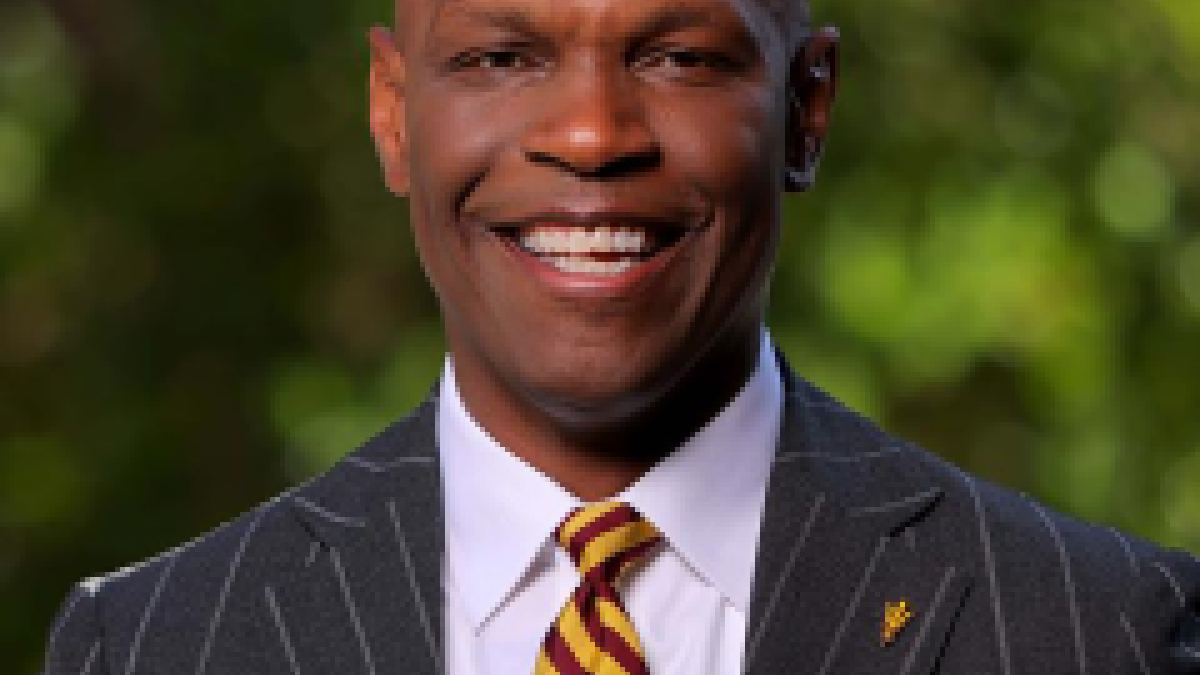History of NCAA the focus of Barrett Honors College talk by ASU executive and former college athlete Chris Howard

Chris Howard is executive vice president and chief operating officer of the ASU Public Enterprise and a professor of practice in Barrett, The Honors College at ASU.
Sun Devil Athletics and Barrett, The Honors College at Arizona State University often work together to support scholar-athletes throughout the university. As part of the recruiting process, Sun Devil Athletics will work with Barrett deans to spotlight how the university champions student athletes and bring in leaders to share their experience.
Barrett Honors College Dean Tara Williams was delighted to learn when she joined ASU in August that Chris Howard — executive vice president and chief operating officer of the ASU Public Enterprise and a former college athlete himself — is also a professor of practice in the honors college. She welcomed him recently for a Barrett talk titled “The NCAA: Past, Present and Future,” in which he shared his experiences as a scholar-athlete and his involvement with the NCAA.
The NCAA has evolved from an organization founded in the early 1900s to regulate rules of collegiate sport and ensure the protection of young athletes after deaths on rough-and-tumble football fields to a conglomerate that directs the business interests and influences the culture of college sports, Howard said.
And the membership organization that now consists of 1,098 colleges and universities and 102 athletic conferences will continue to grow in its significance as collegiate sports change and grow, he said.
When talking about athletics, higher education and the NCAA, Howard knows of what he speaks.
As a scholar-athlete at the U.S. Air Force Academy from 1987 to 1991, he was a starting running back on the football team and won the Campbell Trophy, college football’s highest academic award. He also is a member of the Knight Commission on Intercollegiate Athletics, the former chair of the NCAA Honors Committee, a former member of the NCAA Constitution Committee and a former member of the College Football Playoff Selection Committee.
Howard graduated from the Air Force Academy in 1991 with a bachelor’s degree in political science. As a Rhodes Scholar, he earned a doctorate in politics at the University of Oxford. He also completed a master’s in business administration at the Harvard Business School. He earned a Bronze Star for service in Afghanistan and served with the elite Joint Special Operations Command and as the Reserve Air Attaché to Liberia. He was a helicopter pilot and intelligence officer.
“The NCAA is something very personal to me,” Howard said at the honors college lecture.
Howard said the NCAA is a “uniquely American thing” embedded in universities to support an intercollegiate athletic system. With strong collegiate athletic programs undergirded by the NCAA’s guidance and support comes more monetary donations to universities, he added.
Collegiate sports also serve to give exposure to athletes and signal the quality of a university, he said.
“What is the market value of having teams? It attracts applications and builds admission,” Howard said.
Significant milestones in NCAA history, according to Howard, include the establishment of the NCAA basketball tournament in the 1950s; the formation of the Knight Commission on Intercollegiate Athletics in 1989 to develop, promote and lead changes prioritizing the education, health, safety and success of college athletes; the autonomy of the so-called “Power Five” conference in 2014; and the NCAA negotiating in 2016 an $8.8 billion deal with Turner Broadcasting Company and CBS for the rights to broadcast March Madness basketball games.
Howard said other significant events were the O’Bannon v. NCAA case in 2015, which challenged the organization's use of the names, images and likenesses of former student athletes for commercial purposes, and the Alston Decision in 2021 that removed restrictions on student athletes entering paid endorsement and sponsorship deals in which they could profit from their names, images and likenesses.
In the future, Howard said, the NCAA will likely have to consider the issue of salaries for student athletes.
More Arts, humanities and education

‘It all started at ASU’: Football player, theater alum makes the big screen
For filmmaker Ben Fritz, everything is about connection, relationships and overcoming expectations. “It’s about seeing…

Lost languages mean lost cultures
By Alyssa Arns and Kristen LaRue-SandlerWhat if your language disappeared?Over the span of human existence, civilizations have…

ASU graduate education programs are again ranked among best
Arizona State University’s Mary Lou Fulton College for Teaching and Learning Innovation continues to be one of the best…

